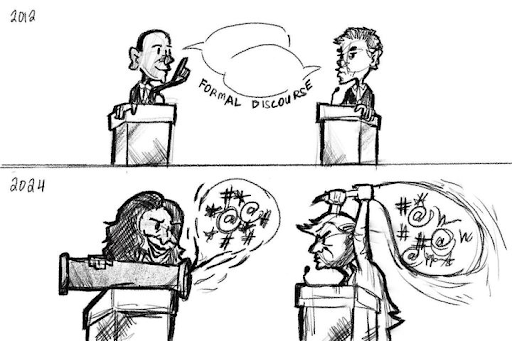I can’t help but be disappointed that former president Donald Trump’s name is yet again on the ballot. American political discourse has always been contentious, but never in modern history has it been as deeply personal, divisive and fear-driven. He is the epitome of yellow journalism gone too far, contradicting and challenging much of what defines a democracy and presidential politics as we know it.
Political discourse has historically been best defined as a debate on policy, not personal warfare. There is a stark juxtaposition between the focus on taxes, healthcare, foreign policy and civil rights versus that of fear-mongering and attacks on paper. The true American experiment — a democracy of the people, by the people and for the people — is in no way represented through our recent politics and its instillment of fear. Trump acts more as a dictator than someone running to be elected by U.S. citizens.
Trump’s two-edged sword debate strategy reflects his disregard for having an intelligent conversation. The first strategy is personal attacks against his foes. The second is the use of fear to divide the populace. These attacks are most prominently expressed through his name-calling, including a few examples: Crooked Hillary, Sleepy Joe, Lyin’ Ted Cruz, Little Marco and Bird-Brain. His diction is unprecedented in its consistency, intensity and oftentimes brutality. Previous candidates and their campaigns worked to omit such direct and unrestrained character attacks from their vocabulary and political strategy. They did so because it reflected poorly on their character and transformed the election into an extremely calcified fight, turning people away and heavily dividing the nation.
American politics haven’t always been so cruel, hateful and unprofessional. You may remember in 2008 when then-Republican presidential nominee John McCain rebuffed a racist comment from a woman who said she could not trust Obama because he was “an Arab,” implying that Obama was a threat to America. “No ma’am, he’s a decent family man, citizen, that I just happen to have disagreements with on fundamental issues, and that’s what this campaign is all about,” McCain said to applause from the audience.
Elections were judged on the basis of what a candidate could contribute to their chosen policies. The political language in 2008 and the relationship between the candidates is almost incomparable to today. We have resorted to muting a candidate’s microphone so that their opponent can be granted the chance to speak. The practice of muting a microphone allows swing voters a better chance to make an informed decision. However, shouldn’t someone running to lead the United States be able to recognize when it’s the appropriate time to speak? Why do we have to treat the potential leaders of our country as though they are in third grade?
The other half of Trump’s strategy is his constant push for fear and division. I was reminded of it this past Sunday when I indulged in a regular Vanderbilt tradition: ending the weekend with a brisk jog through Centennial Park. I rounded the corner to see a bright red hat on a white woman in the distance. Inevitably, we passed each other, and that’s when I made out the words “Make America Great Again” on her hat. For the remainder of my run, I asked myself what I had been wondering for the past few years: What does “MAGA” even mean?
Infuriated after being reminded of the undertones of that message, I began to run faster than my body’s current shape could sustain. The notion of MAGA — what and whom it represents — is undeniably associated with racism. When was America so great? Is the Trump campaign referring to when Black people were not citizens of the United States or when they couldn’t fight for their country? Perhaps they are reminiscing about the time when women couldn’t vote. Maybe America was so “great” when it had the three-fifths compromise.
As a 20-year-old, first-time voter who is majoring in political science amidst this election, I’m defeated. As the Republican nominee continues to say “Make America Great Again,” I grow even more frustrated with the trajectory of our country if he is elected. This slogan is merely a call to return to when straight white men held the vast majority of power.
According to the Prison Policy Initiative, updated in August 2024, 13% of the U.S. population is Black, yet 37% of people in jail are Black, and 48% those in jail serving life without parole, or “virtual life” sentences, are Black. It’s not that they are committing more crimes, but rather that we operate under a rule of law that is unjust — the data proves that minorities are arrested, charged and convicted at higher rates than white people.
The fact is, whatever progress that has been gained by people of color has been given to them by white people, because it is and has been the white population, with the exception of Barack Obama, that has controlled the three branches of the U.S. government. They are, by an overwhelming majority, our teachers in the classroom and our leaders in the boardroom. White people control not just the policies but the narrative, as even our media, the so-called Fourth Estate, is run by white people. It feels as though Trump is claiming that he will not “give them any more” — referring to the Black population as he says this. His movement is popular only because he has created an overwhelming sense of anxiety about losing privilege: an “us versus them” dynamic.
Trump’s attacks have normalized anger, violence and the spread of misinformation throughout our country. There is plenty of evidence demonstrating that election misinformation during the 2020 election was directly correlated with violence. Additionally, there are arguments supporting the idea that Trump’s anger prohibits his ability to effectively deliver his message. The fear-driving politics we are witnessing instill division and increase violence. Normal citizens are becoming aggressive and angry at others for wearing the wrong article of clothing or for having an opposing opinion. Families are being split apart, and both sides are promising Americans that if their opponent wins, it will be a significant threat to democracy. The events of January 6, 2021, are but one illustration of this strong calcification and the sheer terror of losing freedom. When viewed objectively, Biden was never Sleepy Joe or attempting to cut the legs from beneath Trump to overthrow his dynasty; he was indulging in the American tradition of a peaceful transition of power.
Statistics show the substantial difference in debate performance between Trump and Vice President Kamala Harris. The ratio of the lie count 30:1 illustrates the stark contrast from Trump’s over 30 false claims compared to Harris’s one. President Joe Biden left Harris minimal time to mobilize voters, canvas and share her policy. However, I feel as though she has succeeded in re-instilling hope in the American people. She is coherent and potentially the first female president, which is exciting on its own. She made Trump appear as though he were a guilty defendant on a witness stand throughout the debate and managed to, for the most, part deliver the truth.
Rather than attacking Trump and accusing him of being a threat to democracy like Biden, she used her expression as a means of reaction. She didn’t attack his character, but as he spoke, she looked at him in confusion, which drew attention to her and made some of the audience feel as though they should have the same expression.
The answer is not encouragement of personal demagoguery or childish name-calling. My classes thus far at Vanderbilt foster discussions based upon actual policy and rationale, a debate where we, as participants, operate from agreed-upon facts. These discussions have been nothing short of civil, coherent and a return to the truth. It is our job to remember what it means to be American, the sacrifices that have been made and the people who believed in this young nation. Democracy is strongest when we unite and demand that our leaders engage in respectful debates based on facts and ideas on how to solve our challenges.
As students who care about the tone of our nation and its direction, it’s our responsibility to go out and vote. A vote for a leader like Trump is a poor reflection of what I and many of my peers believe. Trump isn’t a role model because of his short temper, inability to hear opposing ideas and his dictator-like language. He doesn’t represent our generation because he is narrow-minded and is moving us back instead of forward.







